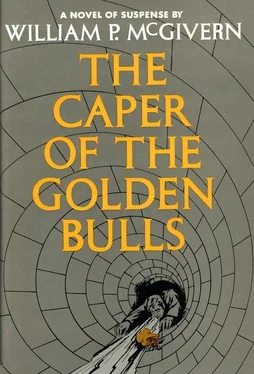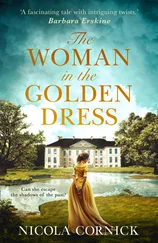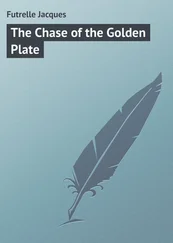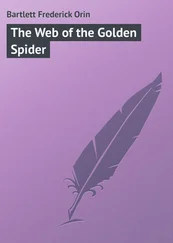“The Japanese make a very good walkie-talkie. With a smart carrying case, imitation alligator leather.”
“No. No Japanese. Zeiss or Audioflex. Don’t economise Mr. Shahari.”
“Is there anything else?”
Peter hesitated. He didn’t care to mention what else he needed, not on an open telephone line. “Yes, there are several other items,” he said.
“But I think I’d better make a list of them. Can you wait in my office for a bit?”
“Of course. But perhaps you will do me a favour, Mr. Churchman. You know the fat American named Morgan?”
“Oh yes.”
“He tells people he is going to kill me in Pamplona. It had to do with his religion. Or philosophy. I’m not sure which. But it is very upsetting.”
“I wouldn’t worry too much, Mr. Shahari. I’ll have a talk with him. Morgan’s harmless. Last month he wanted to kill all the fishermen. He feels they’re poisoning the world with iodine. Before that he tried to start a children’s crusade to liberate Moscow. He thinks it belongs to Belgium.”
“Belgium?” Mr. Shahari’s voice rose slightly. “France may have a claim. But Belgium? He must be crazy.”
“Yes. So stop worrying. If you’d like a coffee or brandy while you’re waiting, just tell Mario. I’ll be along shortly.”
Peter put the phone down and turned his attention to Phillip and Angela. Tiny blisters of perspiration stood out on the Frenchman’s forehead, but Angela seemed over her first queasiness and was now balancing herself with considerable skill.
“Well, Phillip, how do you feel?”
“I could go on for a while, sir. But there’s an ache starting in my shoulders.”
Peter glanced at his watch. This area of his timetable would be tight and chancey, too, he realised. He made a mental note to add Metercal and Rye-Krisp to the list of things he needed from Gibraltar.
“All right, that will be enough. Come along, Phillip.”
Angela slipped down from the Frenchman’s shoulders and smiled at Peter.
“It’s too bad you have to rush away. But why not let Phillip stay with us for lunch? After all, we should get to know each other a bit better.”
“I’m sorry, but we have work to do.”
“Wouldn’t you like to stay, Phillip?”
“Well, yes. But work is work, no?”
“Peter, don’t you want us to know Phillip any better?”
She smiled but he noticed that she was drawing a fingernail slowly across the back of her small hand, ploughing a thin white furrow in the deeply tanned skin. He couldn’t bluff; she held the aces, of course.
He knew what she was up to. She wanted a line on Phillip, wanted to get her claws into him and scratch away at his secrets. But he realised it wouldn’t be wise to refuse her a chance at him. That would only make her more curious. All he could hope was that the sergeant was discreet and nimble.
Angela read his expression and smiled a victor’s smile. She hooked an arm companionably through Phillip’s and looked up at him with innocently masked eyes. “We’ll have a good talk, won’t we! Francois, ask them to send up some wine. We’ll order lunch later.”
Peter went away with heavy misgivings.
Morgan had lost Quince. This had made him sad. On the sunny terrace of Peter’s bar, he confided his gloom and disquietude to new friends.
“Quince was a good chap, but he had his quirks like the rest of us. Had a fear of things getting around, as he put it. Well, turn down a glass. All we can do now. He’s gone back to Wales. Didn’t say why. He was a deep one, all right.” Morgan smiled mysteriously and tapped his forehead. “But he had quirks. Afraid of things causing rows.”
Morgan’s heavy sigh caused a gentle ripple on the surface of his vast stomach. “Good old Quince. He needn’t have worried about it. We could have killed Mr. Shahari quite easily. Taken his money, and thrown it about like confetti.”
Until that instant, Morgan’s grip on his audience had been very tentative; the two Americans who shared his table by accident had been idly watching girls saunter through the sun-splashed plaza; they had kept their interest in Morgan’s nostalgic rumblings quite well in hand.
But now they exchanged glances of mild curiosity. Then they shifted their chairs and looked thoughtfully at Morgan. Their reactions seemed almost reflexive; they responded to the mention of money as men with hearty appetites might have to the sound of a steak beginning to sizzle in a frying pan.
Their names were Tonelli and Blake. Tonelli was the smaller and older of the pair, with thinning grey hair and the eyes and mouth of a migratory used-car salesman. He wore black slacks, a red sports shirt, a gold wrist watch and a ‘sportsman’s’ ring. Blake was a hairy man with bunched-up features and bunched-up shoulders. Tufts of hair grew from his ears. More of it, the colour and texture of steel wool, sprouted from the collar of a wash-and-wear shirt, which seemed to have seen considerably more wearing than washing lately. Blake’s eyes were muddy and dim, and his temper was chronically bad. He enjoyed pushing things to their ultimate limits, whether it was machines or animals or people, but that instant of fierce pleasure which accompanied the breaking point was so painfully fleeting that it set up all kinds of agitations and frustrations inside his head. Blake hated things that quit just when he got them going full speed.
Tonelli’s practised grin flickered over his lips. “Who’d you say you were planning to kill, Fatso?”
“The money changer from Gibraltar. Mr. Shahari. But he’s a victim like the rest of us. Know who we should get our hands on?” Morgan peered warily at groups of incurious patrons seated near them, shifted closer to Blake and Tonelli, his great face rippling with secrets. “Got to get the lawyers,” he said, lowering his voice. “They feed on people in trouble, right? And since everybody’s in trouble, everybody’s fair game, right? Look at you two poor devils. You’re thieves, I imagine. In trouble, aren’t you?”
Tonelli stared at the mountains and said quietly, “You got a big mouth, Fatso.”
“You could catch something in it,” Blake said.
Morgan looked pleased; he leaned forward, chuckling and the press of his stomach drove the table into Tonelli’s ribs.
“Of course you’re thieves. You’ve been stealing God’s precious air since the day you were born. Right?”
“Oh,” Tonelli said, rubbing his side. After a moment of consideration, he added: “Well, if you look at it that way, you got a point, Fatso. But let’s talk about this Indian, this Mr. Shahari, for a minute. He’s got a lot of money, I guess.”
“Oh, yes. One day he’ll have it all. But he wouldn’t come to Pamplona.”
“What’s that got to do with it?”
Morgan looked judicious. “Quince would be the man to see about that. He was a deep one, you know.”
“Well, what were you going to do with the Indian’s money?”
“We planned to scatter it about the city. A gesture of contempt, you understand.”
Blake said wearily: “Let’s find a bottle and go back to the hotel. Maybe we can get something besides a muchissimo gracias from them maids.”
“No, not yet,” Tonelli said. “Fatso’s got me hooked. Okay, Fatso. The big question. Why wouldn’t the Indian go to Pamplona?”
“Well, he can’t. The government smiles on him in the south, but frowns on him in the north. He has a territory, you see.”
Tonelli nodded slowly. “So if he got robbed up north, he couldn’t squeal to the cops. That’s interesting. Tell me something else. What made you think he’d go to Pamplona in the first place?”
“He would if there were enough money involved,” Morgan said sadly.
“He’s very greedy. But he didn’t trust me. You see, I told him I wanted to change twenty thousand dollars. I told him I got it from my father’s estate.”
Читать дальше












